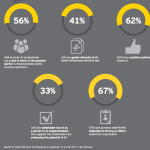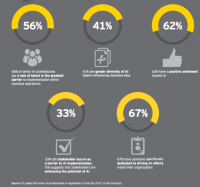These Three Job Skills Aren’t Just For IT Workers Anymore
There are a number of tech skills that used to be reserved for IT managers at companies’ headquarters, or for computer whizzes working out of their parents’ basements. But as digital changes sweep through every level of business, these “applied tech skills” are becoming baseline requirements to getting the job done–they aren’t just specialized knowledge anymore.
To thrive in the future of work, you’ll need to integrate people, processes, data, and devices in order to work strategically and effectively, no matter what unexpected upheavals come your way. In other words, you’ll need to know how to use technology for the benefit of your organization. But so far, there aren’t nearly enough people who can do that that the modern workforce needs.
In new research I recently conducted with DeVry University’s Career Advisory Board on the gap in tech skills, nearly 60% of HR and hiring managers said it was common for job applicants to lack the applied tech skills they needed to succeed. And nearly half reported this same deficit in their current employee base.
We’re not just talking about professional positions, either. According to Burning Glass researchers, jobs that require more than a high school diploma but less than a bachelor’s degree comprise 39% U.S. employment. Today, nearly eight out of 10 of these so-called “middle-skill” jobs require digital expertise, and these jobs offer 18% higher wages on average.
So whether you’re a tenured knowledge worker who wants to stay marketable or a high school student looking out for your future career, mastering applied tech skills is a sensible path forward. Here are three that used to matter just to IT professionals but now can give many more people a leg up.
1. App Development
Remember the days when college kids got rich building apps from their dorm rooms? There’s a reason you don’t hear such stories anymore, and it’s because low- or no-code software programs running in the cloud have made it easy for anyone to develop an app for business use. If you want to be competitive in 2017 and beyond, you may need to understand what it means to be a “citizen developer.”
According to Gartner’s IT Glossary, that’s the term for an employee who creates new business apps using development environments sanctioned by corporate IT. As long as users understand the basic principles behind application design, they don’t have to learn the programming languages that were necessary in the recent past.
Companies are embracing citizen developers because most IT departments are backlogged with requests to develop applications. And even if IT was to take on the request, who says that the IT professional accepting the project fully understands the business requirements? A citizen developer with deep subject matter expertise can use a low or no-code platform to arrive at a solution that meets an individual department’s needs more quickly.
Our research suggests that this skill is now more valuable than ever. In the Career Advisory Board Study, three-quarters of respondents agreed that employees should know how to use technology to make business decisions and solve business problems, while 84% said that employees who know how to use the right tech tools in their fields are more effective.
2. Data Analytics
You may have heard that about the unmet need for data science professionals, and for good reason–it’s one of the most in-demand jobs around right now. But it isn’t just highly credentialed data scientists who are benefitting from that demand. A slew of other fields are now in need of people who are fluent in data analytics, which simply refers to the range of techniques used to draw insights from behavioral data and patterns–an applied tech skill if ever there was one.
One such role is the HR data analyst, who uses her organization’s vast store of information and computing power to answer key questions about her workplace and workforce. For instance: What part of a multimillion-dollar training program leads to the highest productivity? Which factors predict turnover? How should managers choose the right people to lead mission-critical assignments?
A recent Society for Human Resource Management study found that 65% of organizations have increased the number of positions requiring data analytics skills. Some 80% currently have open positions requiring analytics, and 78% say they’re having trouble filling them.
3. Process Management
Business process management (BPM) may not sound like a tech skill, but it is. BPM is an approach to making an organization’s workflow more efficient and adaptable. In this definition, a “business process” is any activity that addresses a specific organizational problem–and since many of those solutions are technological, so are the skills required for managing them.
In fact, an entire industry has sprung up around BPM, which has its origins in the need to reduce human error, miscommunication, and lost productivity. By the last decade of the 20th century, most organizations were already using some kind of BPM software or another, whether for process discovery and project scoping, process modeling and design simulation and testing, or in other forms like business rules engines or workflow engines.
These aren’t systems or approaches many professionals have heard of yet, but that’s largely because it’s taken some time for BPM to move out of IT and into general operations and project management. That’s already happened, though. And just like app development and data analytics, process management is an applied tech skill with uses in just about every department in every company in every industry.
Bringing Applied Tech Skills Front And Center
Traditionally, these applied tech skills haven’t been taught outside of computer sciences programs, but there have been recent calls to change that. At a SXSWedu panel that I joined a few weeks ago, Zuckerberg Media CEO Randi Zuckerberg said that “educators and employers must come together and start a dialogue on how to . . . create curriculums that translate to the technology skills required in today’s workforce.”
On the panel, DeVry University president Rob Paul and GE’s digital learning and technology leader Sarah Ley discussed how they’re doing exactly that. For instance, in order to upskill its current workforce and narrow the technology skills gaps, GE developed BrilliantYOU, an educational offering that is created through partnerships with higher education institutions like DeVry.
One thing’s for certain: If we thought the tech skills gap was critical before, it’s even bigger now. Hopefully with help from educators and employers, savvy workers will brush up on those skills fast. I remember paging through Coding for Dummies in order to understand the work my website developers were doing back in 2000. These days, the principle is the same even though the needs have changed. I’ve just added “take a Udemy or Lynda course on data analytics” to my list for the year–what about you?
Alexandra Levit is a business futurist and best-selling author who has consulted for the Obama administration as well as Fortune 500 companies including American Express, Deloitte, Microsoft, PepsiCo, and Whirlpool.
Fast Company , Read Full Story
(22)














